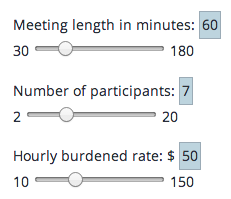Meetings as Competitive Sport

Many years ago, I met with Michael Harrington, a public speaking coach and trainer. He described his training approach as that of “taking a competitive sports view” to public speaking.
His view was that you could train people with some very specific skills and thereby teach them to win the day, so to speak.
For some reason, that competitive view of public speaking really worked well for me. The task of public speaking became something I really wanted to master, rather than something to be dreaded and endured.
Meetings Are Serious Business
I have a similar idea about meetings. When I was just starting out at Intel Corporation, we were trained in effective meeting practices because Intel recognized that 1) meetings weren’t a diversion, but rather where management did real work, and 2) it was too critical to the company’s success to waste people’s time and energy on something that lacked structure and results-orientation. I don’t know how many times I heard “don’t tell me you went to this or that meeting, tell me the result!”
Related: What did you Get Out of that Meeting, and how do you know?
What about meetings beyond the corporate environment? I once heard someone claim to use his superior knowledge of Robert’s Rules of Order as a strategic weapon during a standards committee meeting. Ouch! This is someone who wants to create a specific outcome for their company, and one that may or may not be in the group’s best interests. They’re willing to go to great lengths to make that happen. If you don’t think other people are preparing for results and managing their meetings, then you better think again.
How to be a Lousy Competitor
Let’s say you’re an individual contributor – perhaps a typical software developer – who hates meetings because they interfere with your “real” work (which may be true!). You dread going, so you don’t bother preparing. You trundle in a few minutes late, only pay half attention, then slip away before someone can assign you any followup work. Whew! You have successfully avoided making an impact or any kind of connection with your teammates and managers. If you’ve made any kind of lasting impression, it’s probably not the kind you’d want.
If this were a sports situation and I were your coach, I’d have to bench you for lousy performance.
How to be a Great Competitor
So, let’s try that again. You’re an individual contributor invited to a meeting. The first thing you do is ask the organizer to describe the meeting goal and to send a copy of the agenda. You also ask for a list of people invited to the meeting. This looks like a meeting that might impact your work in some very significant ways. Since you want to make sure your voice is part of the discussion, you let the organizer know that you’re coming.
Related: Plan to Communicate, and have a Communication Plan
After reviewing the agenda you realize there are some complicated decisions to be made. You ask the organizer for a copy of the meeting materials in advance so you can think about the ramifications of various alternatives being considered. As part that review, you exchange email with another colleague who is invited to the meeting and, together, you come up with a plan of attack.
You arrive at the meeting a few minutes before the scheduled start time and find a seat where you can make eye contact with the organizer. It’s apparent pretty quickly that half the people in the room are checked out (they’re the old you!) and the other half simply haven’t prepared adequately. Because you’ve already had an opportunity to think about the issues under discussion, you catch the organizer’s attention and become the most active contributor to the conversation and decision making process. Things go your way because you’re the most prepared person in the room. Victory!
The meeting ends twenty minutes early because there’s nothing left to discuss. Before leaving, you ask the organizer to review the decisions made during the meeting and for a list of all assigned action items. You volunteer to send the meeting results to everyone invited to the meeting. Suddenly you’re in the driver’s seat.
If this were a sports situation I’d make you a starter on the team and help you become a team leader. Sure beats sitting on the sidelines while everyone else has all the fun!
End Thoughts
That little scenario is just one of a thousand I could talk about. In a competitive situation, companies that are more prepared and more organized beat those who aren’t. Sales people who are prepared and organized close more sales than those who aren’t. Politicians that are more… well, you get the point. Who would ever waste time being unprepared? Semper paratus.
If you search the internet for thoughts about effective meeting practices you’ll get millions of results. Unsurprisingly, they all say some variation on the same themes: have stated goals, prepare in advance, manage within the meeting, document the results. Why do we keep talking about the same things, over and over and over? Maybe we just like to hear ourselves talk, or maybe we think people just don’t know what to do. Well, I think people know – at least in a general sense. They just haven’t had a compelling enough reason to follow the advice. Maybe it’s time to stop thinking about meetings as drudgery and start thinking about them as opportunities to spread your opinion and influence the way people think. That’s a sport worth winning.



